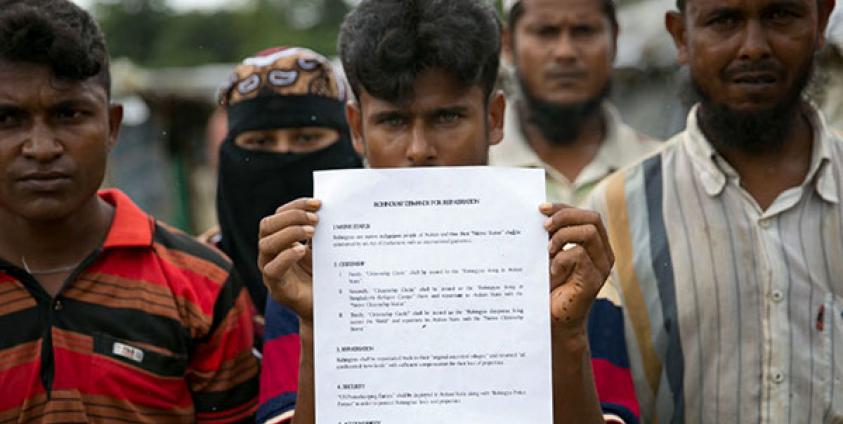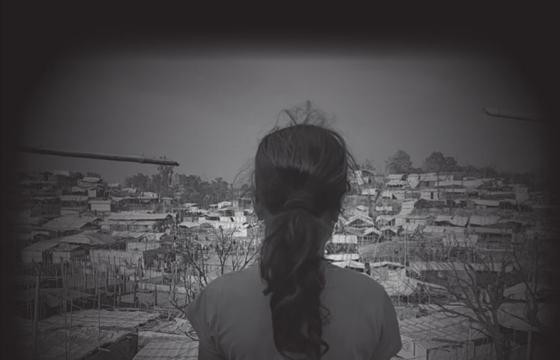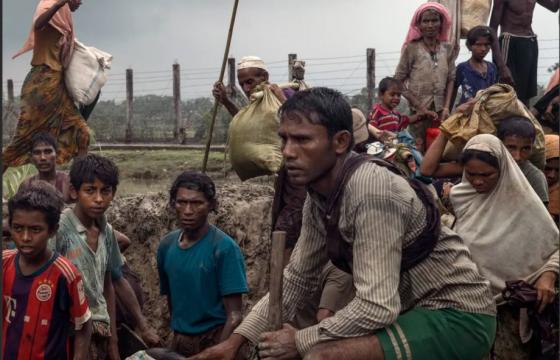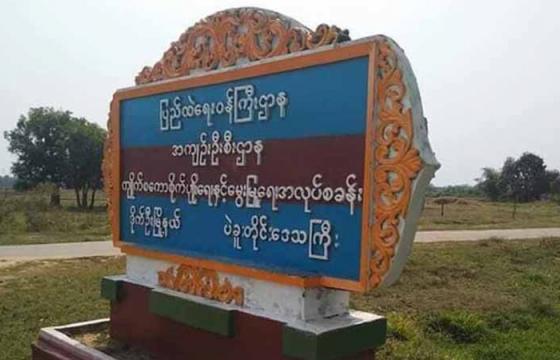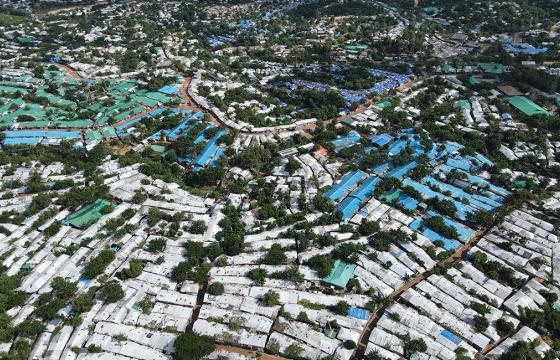Rohingya refugees in Bangladesh told UNHCR they would not go back to Burma until their demands were met, when officials distributed leaflets about repatriation door-to-door in Camps 26 and 27 near Teknaf, Cox’s Bazar, on August 21, 2019.
A Rohingya woman with her baby standing outside the office of camp-in-charge of camp no 26 shalbon, teknaf after appearing for an interview with UNHCR and RRRC
The UN Refugee Agency has been interviewing the 3,450 Rohingyas cleared for return by the Burmese government since August 20. The engagement, officially called an intention survey, is a key part of the voluntary return of the refugees.
The survey conducted by the UNHCR began at 9:00 am at Camp 26 (Shalbagan). Bangladesh Refugee Relief and Repatriation Commission (RRRC) officials were also present during the sessions. Workers from both the organizations, however, refused to say the number of Rohingyas who appeared for the survey, which continued till 5:00 pm.
“Interviews of the Rohingyas will continue. After completing the interviews of all 1,037 enlisted Rohingya families at Shalbagan camp, we will be able to confirm if they are willing to go back,” said Mohamed Abul Kalam, RRRC Commissioner.
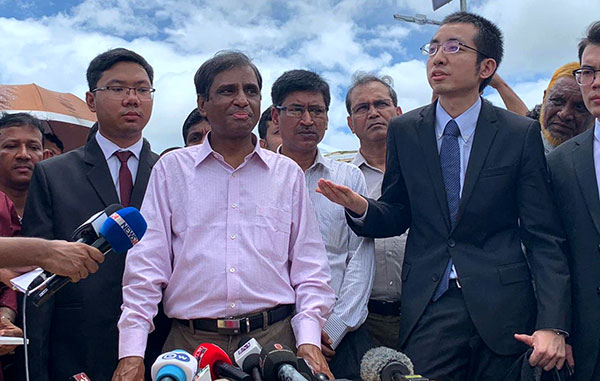
But the attempt at repatriation failed to kick off when no Rohingya turned up today (August 22, 2019) for repatriation from Bangladesh to Burma. Mohamed Abul Kalam announced this at a press briefing held at Shalbagan at 4 pm today. An official from the Burmese Embassy and two officials from the Chinese Embassy were also present at the briefing.
Commissioner of Refugee Relief and Repatriation Commission (RRRC) Mohammad Abul Kalam along with other officials during a press briefing held at Shalbagan in Teknaf, Cox’s Bazar
Even after authorities told the Rohingyas that Burma was ready to accept them as its nationals, many of the refugees interviewed on Wednesday said they would not go back to their homeland until the government guaranteed meeting their five demands, including citizenship.
The Rohingyas’ demands are: to hold accountable those who killed and tortured the Rohingyas and drove them out of their land; to ensure citizenship and security of the Rohingyas in Burma; to give back their land and property; and to protect all fundamental rights of the Rohingyas in Myanmar’s Rakhine State.
Rohingya at the Nayapara refugee camp in Cox’s Bazar hold a list of their repatriation demands
Badlul Islam, a Rohingya camp leader, said the leaflet mainly focused on providing national verification cards (NVC). “But the Rohingyas are still scared due to the bitter past when they were driven away in the name of being provided the NVC,” said Islam.
Mohammed Riaz, one of the session attendees, said the UNHCR officials told him nothing new, adding that he would not return to Burma if their demands were not met.
Rashid Amin, who also attended the session, told the reporters that the whole exercise was “nothing but an eyewash.” He said discussion of their voluntary return should have been carried out with Burmese officials.
Detailing the content of the leaflets, Noor Bashar, a resident of the camp, said they said they would have to get the NVC first upon their return to Burma.
After that, they would be kept in Ngakhura camp in Maungdaw, from where they would be shifted to another camp in the country for six months.

Another leader, Nosima, from Camp 26, said Rohingya women had been raped and killed. “We need security. Without security we will never go back.”
“We need a real guarantee of citizenship, security and promise of returning to our original ancestral lands. We must talk to the Burmese government about this before repatriation,” said Md Islam from Camp 27.
Overview of the Refugee camp
Sources said many listed Rohingya families have also been moving around camps to avoid being called for the interviews. They have apparently been staying with their relatives for days, hiding away from the authorities.
Similarly, in Camp 26, Rohingya refugees had run away when Bangladesh and UN officials came to the camp early in the morning today, said a refugee from the camp.
Meanwhile, Bangladesh Foreign Minister AK Abdul Momen said both Bangladesh and Myanmar were ready to resume the repatriation of Rohingyas to their homeland, but some Rohingya leaders and NGOs were discouraging the refugees from returning, reported United News of Bangladesh on August 21, 2019.
“We’ve heard some Rohingya leaders have emerged there. They don’t want the return of any Rohingya [to their homeland]. They’re trying to stop the returnees. Some INGOs [international non-governmental organizations] and NGOs are instigating them [Rohingyas],” Foreign Minister Abdul Momen told a small group of reporters at his office in the afternoon.
“The international community keep saying that there must be safe, voluntary and dignified return, but are doing nothing to pressure Aung San Suu Kyi to make that a reality,” said Tun Khin, President of Burmese Rohingya Organisation UK. “Safe voluntary and dignified return means full citizenship, an end to discrimination, and justice and accountability, such as referring Burma to the International Criminal Court.”
The Myanmar and Bangladesh governments should suspend plans to repatriate Rohingya refugees until returns are safe, voluntary, and dignified, according to a Human Rights Watch press release dated August 21, 2019.
Today, conditions for return are even worse. Fighting with the Arakan Army continues to escalate in Rakhine State. Nor has there been a sign that Burma accepts its accountability for mass atrocities. UN agencies have not been granted access to Northern Rakhine State, where displaced communities struggle to survive in the forests without access to medical or food programs.
The most important condition of all, the restoration of citizenship, has not been met. This is not a repatriation plan; this is a death sentence, according to Burma Task Force, USA.
Empty seats of a bus parked in Cox’s Bazar for repatriation of Rohingya refugees from Bangladesh to Burma
Bangladesh authorities have set up two transit camps — one on the banks of the Naf river near Keruntali of Nayapara in Teknaf and the other near the Ghumdhum border area of Naikkhangchhari in Bandarban.
Under immense international pressure, Burma had signed an agreement with Bangladesh in January 2018 to take back the Rohingyas.

